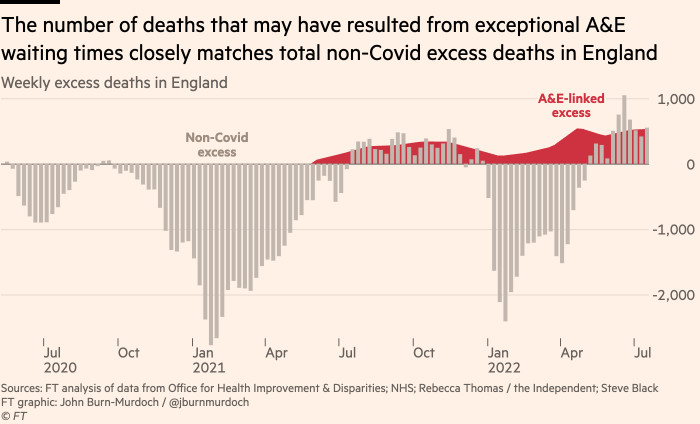This article is an on-site version of our Inside Politics newsletter. Sign up here to get the newsletter sent straight to your inbox every weekday.
The UK economy contracted by 0.1 per cent in the second quarter, in part down to the unwinding of the country’s test and trace system and households reducing spending due to cost of living pressures.
But it’s the fourth quarter when the UK economy is really expected to take a turn for the worse, as the rise in energy prices further hits incomes and GDP. Some thoughts on what will happen in September and October and the political challenges for both parties follow.
Inside Politics is edited by Georgina Quach. Follow Stephen on Twitter @stephenkb and please send gossip, thoughts and feedback to insidepolitics@ft.com.
It’s over £5,000!
Another day, another alarming prediction for UK energy bills, which are headed to more than £5,000 within months according to consultancy Auxilione. And for fans of alarming charts, here’s what the damage looks like, using Cornwall Insight’s latest forecast:
The Tony Blair Institute has set out the pressures facing households with a couple of bleak charts of its own in a new report. The short version: cutting income taxes won’t do anything to help the poorest bear the cost of increased energy bills.
Liz Truss’s plan to reverse the rise in national insurance contributions would help the poorest households by just 76p per month on average, the TBI found.
From this, I think, we can safely conclude that the next prime minister, whoever she may be, is going to have to announce something sooner rather than later.
But for the moment, the question being asked at Westminster is: what’s Labour’s alternative? The party has remained relatively silent on the crisis thus far. But now Labour is setting out its stall, though for the moment the measures it is suggesting are pretty small beer: a commitment to end the greater charges faced by people with prepayment meters rather than direct debits, for example, is not going to touch the sides as far as most people’s energy costs are concerned.
One of the opposition’s priorities is to establish its economic credibility, and one reason it has been reluctant to avoid setting out the party’s position is that we won’t know precisely how much household bills are set to go up by until 26 August, when Ofgem reveals the new level for the energy price cap.
Sir Ed Davey, leader of the Liberal Democrats, has called for the price cap rise to be scrapped and for the government to cover the £36bn cost of the increase. It’s certainly possible that Davey’s plan will prove hugely inadequate, and it’s also true to say that Labour’s plans would face greater scrutiny than the Lib Dems, because the Liberal Dems are the third party while Labour is the official opposition.
But I think Labour is making two mistakes here. The first is that it seems unlikely that the next election will be fought at a time when the party can avoid talking about borrowing to fund its economic and social plans — every day when it is not doing what Sunak is doing today and talking about the need for some borrowing in the short term is a day it is saving up trouble on that front later.
And Labour is almost certainly underestimating Truss. Sure, it’s possible that she will take office on September 5 and say absolutely nothing of substance on the pressures facing households until late in September. It’s possible that anything her new government does will be heavily focused on tax cuts rather than economic support for households and businesses.
Possible, but not, I think, all that likely. It seems to me more probable than not that the new prime minister will announce the broad outlines of her plan to support households within days or even hours of taking office, that the plan will be fairly expansive, and Labour might find that it has missed its moment to set out its own position.
Oh NHS, thou art sick
Now, there are any number of reasons why I might be wrong about the above, but more importantly it might not matter. Broadly, Labour tends to win elections when the focus is on the condition of the public services, and the UK’s public services are not in a great state right now. John Burn-Murdoch sets out the difficulties facing the NHS and the grim cost it is having in human lives in the Data Points column this week. Here’s the key chart:

Now the most important thing about this is that it reflects a serious and lethal crisis in the UK healthcare system. But the political consequence is that you would assume, all things being equal, that the NHS will continue to be in profound and serious difficulty by the time of the next election.
And we’d expect the well-known problems in UK policing will continue to cause voters alarm and to dominate media attention. One police force in England and Wales visits only one in four homes that have experienced a burglary is the latest alarming find from the Telegraph.
Now, if you drew up the perfect circumstances for Labour to fight and win an election, you would make it one in which large parts of the public realm were crumbling, there was a growing sense that the UK state badly needs more spent on it, and the UK economy was working pretty well. And that’s basically the circumstances in which Labour fought the 1997 election.
I’m not saying that leaders don’t matter: one way that successful leaders help is they can do things that increase the salience of their party’s preferred issues, and reduce the number of awkward side issues they might have to fight the election on instead. In opposition, David Cameron did a good job of defusing Conservative weaknesses on the NHS, just as Tony Blair did a generation earlier on the economy.
But events play their part too: and how Labour has positioned itself on the economy, social issues and Brexit may ultimately prove irrelevant if the next election becomes a public services one.
Now try this
I was one of the guests in the BBC’s Larkin Revisited series, talking about one of my favourite poets, Philip Larkin, and specifically his excellent poem Talking in Bed. You can listen to me and several other better qualified and more engaging people talking about Larkin, life and love here.























Discussion about this post